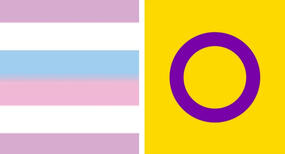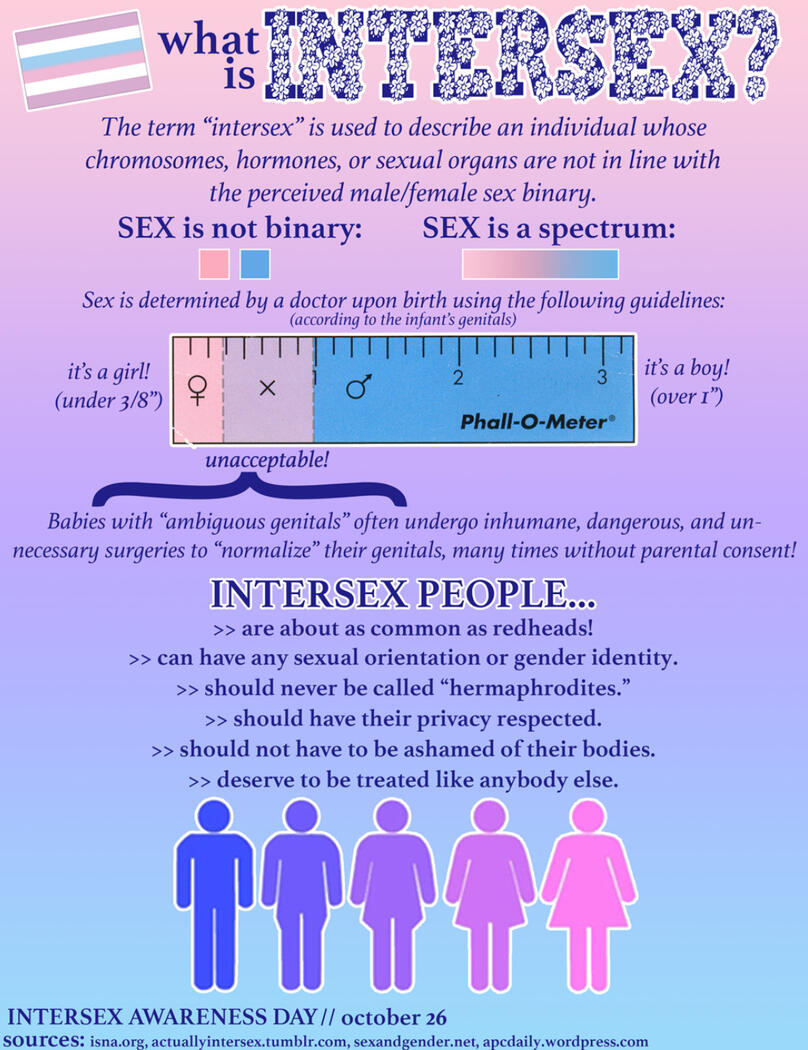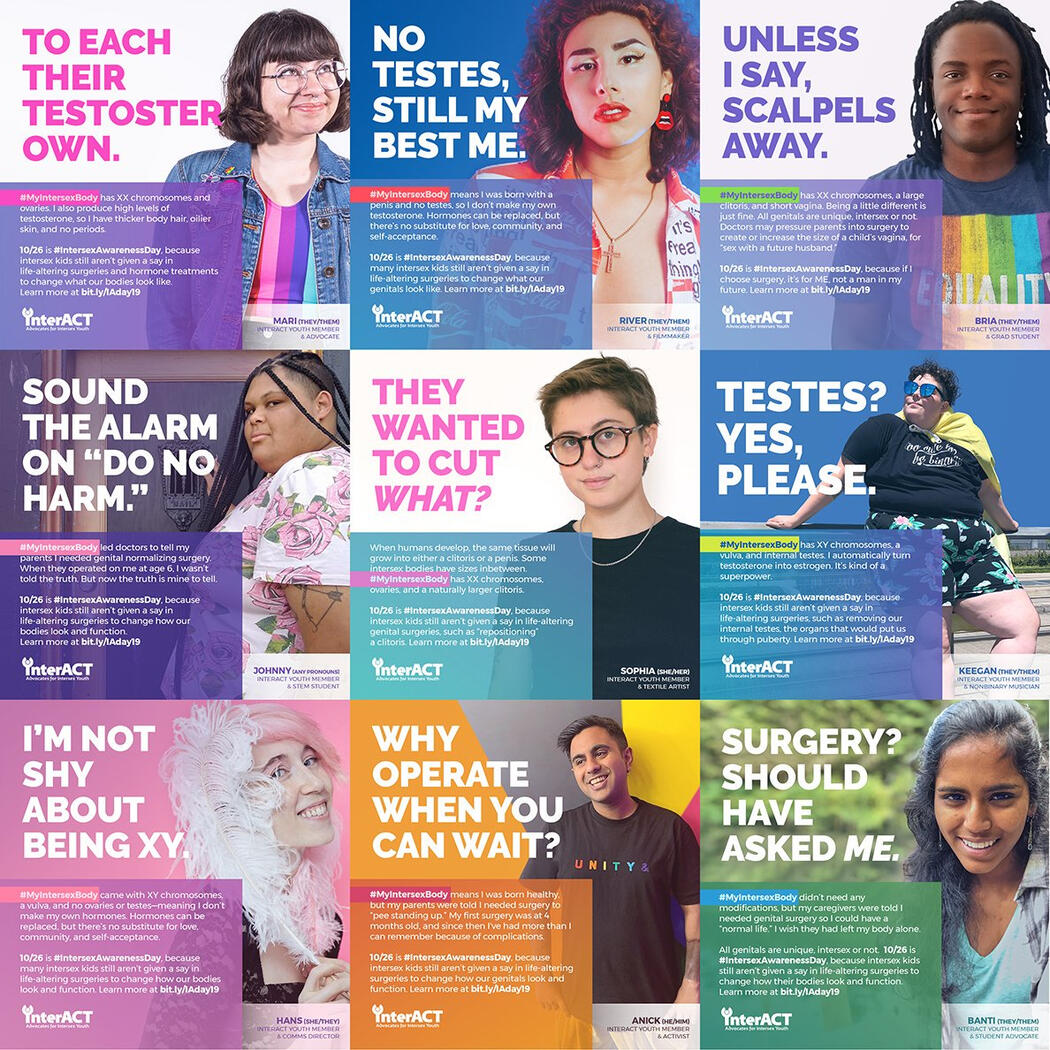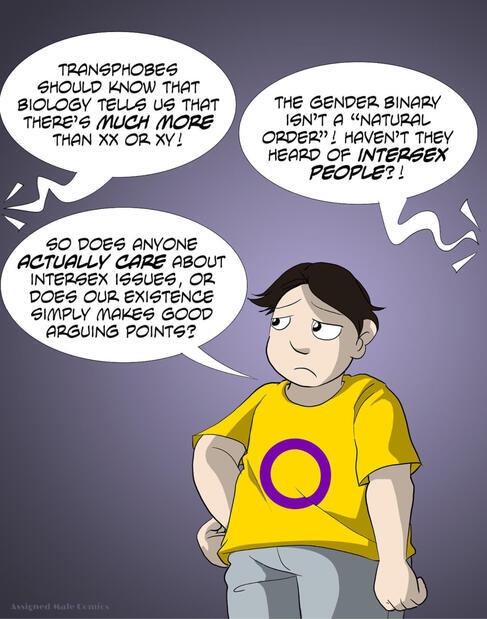click to begin
(a link to carrd 1 & 2 compiled and more alt text accessible found here)
What is Intersex?
"Intersex is an umbrella term for differences in sex traits or reproductive anatomy. Intersex people are born with these differences or develop them in childhood. There are many possible differences in genitalia, hormones, internal anatomy, or chromosomes, compared to the usual two ways that human bodies develop.Some intersex traits are noticed at birth. Others don’t show up until puberty or later in life. Intersex people often face shame—or are forced or coerced into changing their bodies, usually at a very young age. Most surgeries to change intersex traits happen in infancy.The word intersex also invokes a community. Intersex people are diverse, coming from all socioeconomic backgrounds, races, ethnicities, genders and orientations, faiths, and political ideologies. We are united by1. our experiences living with variations in our sex traits,
2. the belief that these differences are a natural part of human diversity,
3. the idea that people deserve their own choices about their own bodies." - InterACTFor a lot of intersex people and intersex activists/advocates, the identity is a broad label that includes people who naturally (as in not from a trans person medically transitioning, for example) have atypical sex traits such as sex chromosomes, sex hormones production, sex hormone response, genitalia, gonads, internal sex organs, and secondary sex traits (such as breast development or body hair), atypical meaning those that fall outside of what is typically considered “male” or “female.” (What is defined as atypical can vary from culture to culture.)A lot of intersex people and intersex activists see sex on a spectrum; here is a good TED talk that speaks about the harm of the sex binary and here is a good blog post that breaks down exactly how sex is a spectrum
Are intersex people transgender?
Inherently, no. Being intersex means you have natural atypical sex traits. Being transgender means you don’t identify with the gender you were assigned at birth. Intersex people can also be transgender since we are assigned a gender at birth more often than not, including through means of IGM, and it is of course sometimes the wrong assignment. So while they are not inherently the same, they can overlap, including having common issues, such as fighting against gender assignments at birth. This does not mean you should add labels like cis, trans, or nonbinary to intersex people without consent as our experiences are different from perisex people. But to say things such as that all intersex people are transgender or intersex people can't be cis is blatantly wrong and erases both cis and trans intersex people's experiences, which are very different experiences. To clear this up for people who may still be confused on how this works, I will set up a hypothetical situation: A baby is assigned female at birth, based on the outward appearance of genitals alone. This person was raised as a female but later finds out they have XY chromosomes, no uterus, and undescended testes. They are intersex. If they identify as male, they could say they are transgender (if they want to), because they were still assigned female at birth and don't identify as such. If this person identifies as female, they could say they are cis (again, if they want to), because they identify with the initial assignment. When it comes to intersex cases, labels like trans and cis should only be applied if the person is comfortable with it because our experiences are entirely different from perisex people, and also it should be recognized that if said hypothetical person did identify as a trans man, he'd also have different specific obstacles to face as an intersex trans man than a cis intersex person or a perisex trans man would have to face. You should never deny how an intersex person identifies because they're intersex.
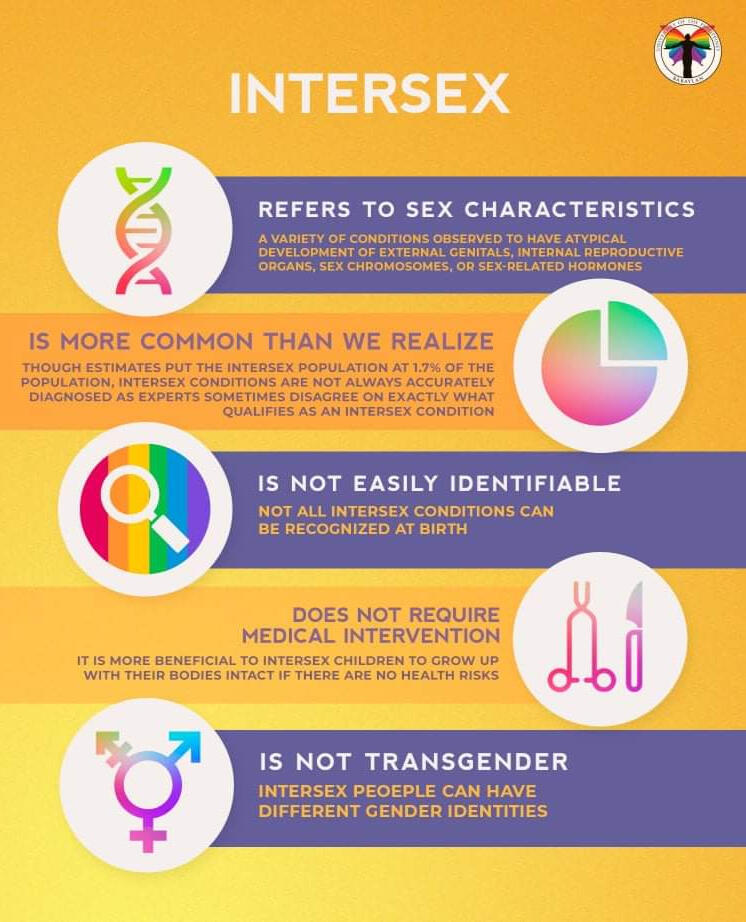
What do intersex people face?
What you'll probably hear fought loudest against is intersex genital mutilation (IGM). IGM is when non-medically necessary surgeries are carried out on intersex people without consent, usually either fully or lying about why the surgery needs to be done (when it doesn't), to improve the chances of the intersex person leading a "normal" cisgender and heterosexual life. When we talk about this, we mainly mean when it happens as an infant or as a toddler, since that is when it is most commonly done (and the most vile thing since children absolutely cannot consent), and then as a result, plenty of intersex children's childhoods are filled with memories of even more surgeries and often due to complications from the first (unnecessary) one, and also often pedophilic medical procedures and 'routines' performed to make sure their genitals are "functioning like they should be". But it can also happen later in life, usually after being lied to about the reality of what the surgery was or without full informed consent. Many intersex people fight against this happening without proper informed consent, others fight for it happening at all (except when medically needed) since we are all ingrained with intersexphobia. Read some stuff about IGM in this thread.Another common thing intersex people face is forced or coerced medical intervention other than IGM, such as hormones replacement therapy (HRT) or hormone suppressors. Even in people with smaller hormonal differences that are not harming them medically or emotionally, it is normalized to 'treat' them with hormone replacement therapy and/or hormone suppressors to the point some of those people don't realize that that is an intersex experience and intersexphobia.Intersexphobia (also known as interphobia or being intersexist) is the general term for discrimination against intersex people. It can happen in a lot of ways, from slight to extreme. Some examples are:
- IGM.
- Forced/coerced HRT.
- Forced/coerced hormone suppressants.
- Calling intersex people hermaphrodites (this is a slur when aimed at people, and can be reclaimed, but only by intersex and, debatably, trans people).
- Only bringing up intersex people as a response to transphobia (discrimination against transgender people).
- Believing that intersex people should be "normalized" into being male or female.
- Believing sex is binary.
- Using bio essentialist language, like saying women have vaginas/ovaries/breasts/menstruate/etc and men have penises/testicles/sperm/etc.
- Saying XX chromosomes or a vagina means you're a woman and XY chromosomes or a penis means you're a man, and/or use those traits to identify an intersex person's gender rather than identifying them by the gender they tell you they are.
- The belief that your gender is whatever you were assigned at birth.
- Forcing labels onto intersex people who feel they don't fit them, like cisgender, transgender, nonbinary, or certain sexualities.
- Thinking intersex athletes need to have typical sex characteristics to compete, especially if that means medical intervention to give them "typical" sex traits.
- Medicalizing the intersex label; equating intersex to just being 'disordered'.
- Saying we can't be "real" men or women.
- Saying we are rare, mutated, or a defect, especially when trying to discredit our existence.
- Excluding intersex people from the LGBTQ+ community that want to be included.
- Only bringing up intersex people to say we don't want to be considered LGBTQ+. (note: a survey shows that 75.6% of us believe we belong)
- Doctors photographing intersex bodies for medical journals without consent.
+ many many more
Some politics behind the intersex label:
Medical professionals would say that most intersex people have a Disorder of Sex Development (DSD), but not all conditions that cause intersex traits are considered a DSD and lots of intersex people find the term DSD very stigmatizing and dehumanizing. Info on the argument here. To sum up some of the confusion (especially in the LGBTQ+ context), DSD replaced intersex in medical settings due to it being too broad of a term, but it did not replace it as an identity. So DSD is a medical term, intersex is an identity, an identity based on physical traits, which DSDs (+ more) can cause. A medical professional is most likely to tell you that you have a DSD than they are to call you intersex, that is if they bring it up at all. (Another term you may see is VSC, which stands for Variations of Sexual Characteristics.)Being intersex is not inherently a medical condition, and many intersex people do not want the label intersex or our traits in general to be medicalized, but rather seen as a difference in our bodies that should be embraced and normalized, because our bodies are normal. We just happen to often have conditions that cause our traits, but it's our traits and how society reacts to them that makes us intersex, not us having a medical condition.Not all intersex people agree on the same things, since we all have our own personal beliefs and experiences. Some will argue over terms, what ‘counts’ as intersex, and you may even come across some who don’t label themselves as intersex when the label fits, some even support IGM (The best word we have for these people are intersex medicalists, who are often TERFs and truscum masked under the disguise of fighting for intersex rights. If you see a self proclaimed intersex person talking about how the sex binary is good actually, run.) But the beliefs I am writing about are shared by me and is generally the same as most of the people fighting for our rights and against IGM and other unnecessary medical interventions.(Thanks to the Intersex Justice Project, Lurie Children’s Hospital is putting an end to intersex surgeries!)
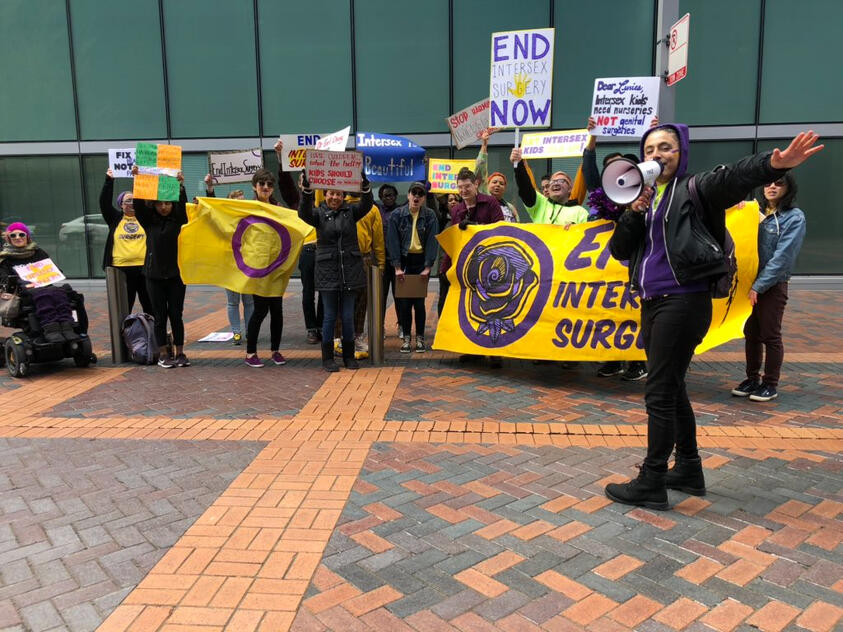
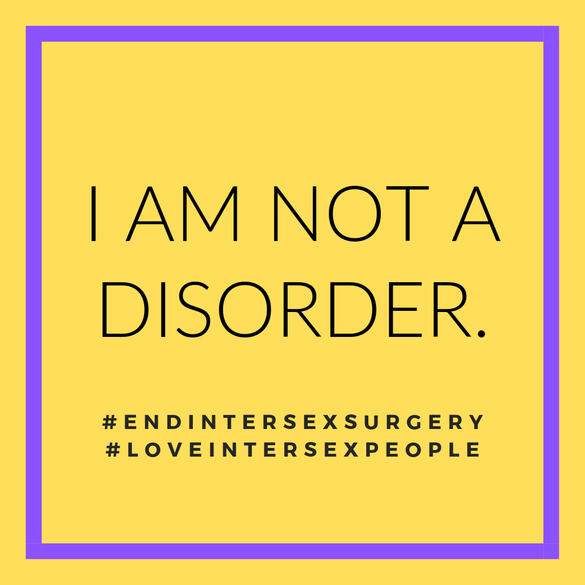
Could I be Intersex?
You very well could be! Determining if you are intersex yourself is something people often have to undertake on their own, as that word may not be used in a medical setting for lots of people who have intersex traits (and often depends on what condition is causing the traits). Some people find out later in life that they very much are intersex, and some people never find out at all. You generally will have some idea if you are genuinely questioning, though. A lot of the questioning is based on experiences with your physical attributes and how people (doctors, your family, society) react to those attributes. There is of course politics in over who is 'really' intersex, but the people who can claim this identity at this time (in my personal opinion as an intersex person) are people whose bodies do not fit those societal norms imposed on them (and what's expected in their culture) and have had said people (doctors family, society) react to their body and how it naturally developed (for context, usually with surprise or contempt). This usually often means being forced or coerced, whether by medical professionals or your family, to stick to a typical binary idea of what you were assigned at birth. You may have questionable medical experiences from your childhood, scars that don't make sense on your genitals, or you may just have a feeling that your body is developing or did develop "wrong" for your assigned sex at birth. All of these are valid reasons to start questioning, and talking to other intersex people can benefit you.Whether you end up taking on the intersex label is up to you and your experiences, but nobody should tell you that you aren't intersex enough. It's wrong to base your intersex experience all on a specific diagnosis or having medical trauma, because we shouldn't base our experiences on trauma alone or our identities on a diagnosis; rather we should be focused on how our traits make us "different" and working toward trying to normalize that sort of "different" so that future intersex children don't have to grow up in a world that medically forces them to be "normal".
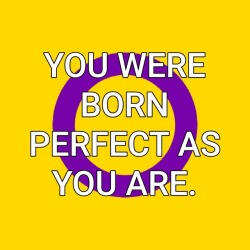
A Few Videos to Watch
Here are some videos by the intersex activist, artist, and YouTuber named Hans Lindahl that I strongly recommend because they cover a lot of what I've mentioned + more, and really helped me understand intersex topics more. Perisex (or endosex /dyadic, meaning non-intersex) people should definitely watch these if they aren’t educated on intersex experiences, issues, or politics:1. What is Intersex? Pt 1
2. What do intersex bodies look like? Pt 2
3. What ‘counts’ as intersex? Pt 3A good video for people questioning if they're intersex (mainly if you're hoping you are, especially if you're trans/nonbinary):
4. How do I know if I’m intersex?This is a video series by the activist Pidgeon Pagonis that I recommend for those who want to learn more about the intersex experience, especially from the lens of someone who has gone through IGM.1. HI I'M INTERSEX
2. HI I'M INTERSEX PT 2
3. Hi, I'm Intersex Pt 3
4. Hi I'm Intersex Pt 4I STRONGLY recommend you watch ALL of these videos if you truly want to learn more about intersex people and the intersex community, and want to be an ally to us. Do not just skip over them. If you have to, bookmark them and watch them whenever you're bored!
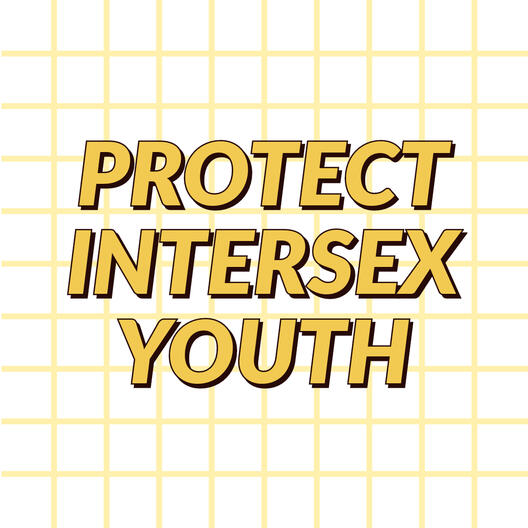
Note
I am only one person making this to help further Intersex education, but because I am one person, you are going to have information that is biased towards my idea of the intersex community. What I say in this carrd may be the complete different opinion from the intersex person you know, which is why you should never take one intersex person's word as what is absolutely right or wrong about the community, as we are not a monolith and we all have our own opinions. Don't ever speak for us, just uplift our voices. You should use this carrd as an intro to what being intersex is, what our activism is for, and continue yourself by following intersex people's social media and fighting for our rights with us. Please read Pt. 2 if you want to find out good intersex people and organizations to follow on Twitter, Instagram, and Tumblr and about our pride flags.Edits for Pt. 1 and/or Pt. 2 were last done on December 27th, 2021.Edit on October 26th, 2022 to add the new Intersex Glossary by interACT!
